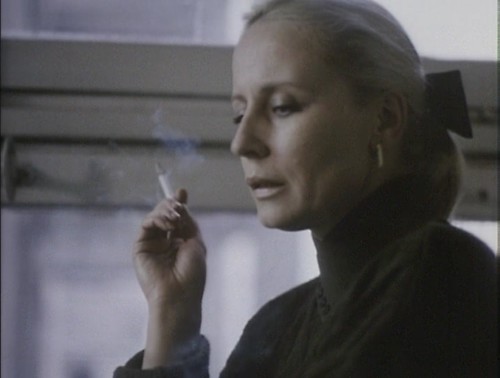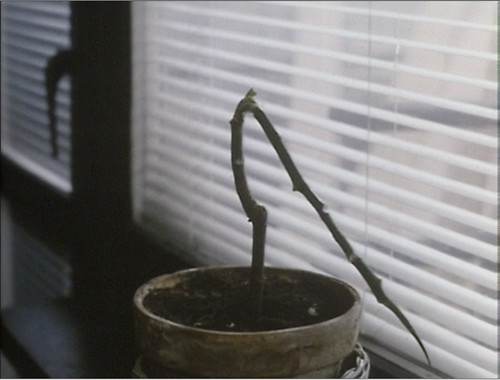Screenplay: Krzysztof Kieslowski and Krzysztof Piesiewicz
After seeing things like Juno and 4 Months, 3 Weeks, 2 Days, it's a relief to see Decalogue II, which is so refreshingly apolitical. Juno and 4 Months bring abortion to the forefront; losing their dramatic integrity in the issue itself and in the case of Juno, the added distraction of making the characters insufferably hyper-hip. Decalogue II is such a raw, naked, and honest piece of filmmaking by comparison. It's not about the scandal of pregnancy from an affair while your husband is on his deathbed; it's about the individuals involved in this drama; their reactions and frustrations with the situation rather than the situation itself. The movie never loses sight of that.
This isn't to say Decalogue II denies of the significance of abortion as a moral issue; it's just beside the point. Sure, there's the Polish Catholic milieu to consider, but our focus in Decalogue II is on the people that populate the story. It is their fears, uncertainties, and frustrations that are so compelling because we identify with their humanity; with their moral and existential quandary. Dorota's choices carry with them such intense ramifications that to act prematurely would be devastating, should her choice be the wrong one. Abort her baby and hope her husband lives? Or keep the baby under the impression her husband will die?
Such a choice might be easier if she knew the outcome. Might be. But she doesn't, and therein lies the frustration: uncertainty. It is human to desire knowledge; to desire control; to be able to make a rational decision. It's funny how easily we can trick ourselves into thinking that everything is answerable; that somewhere out there, there is some expert or wise man who can tell us exactly what to do. For Dorota, this is the doctor. She urgently pursues him; hopeful he'll give her the answer she wants, which would be any answer other than the one he gives: he doesn't know.
Krystyna Janda is good in this role. Her face pale and gaunt, she's a woman worn down by waiting. There's an undercurrent of anger in her face, as if her own stasis has started to freeze over her ability to react. When the doctor tells her he really doesn't know what Andrzej's outcome will be, her face gives the slightest ripple of emotion. Janda's acting is the antithesis of melodrama. Like her performance in Tatarak, she is an actress of subdued expression; willing to play characters who cut close to reality and achieve a naked rawness that's genuine and beautiful.
Indeed, Janda is at once weathered and strikingly beautiful; still showing lingering vestiges of vibrance and youth in her middle-aged years. Her pregnancy is a powerful reminder of her waning years of fertility. Those years are a time bomb; counting down to Dorota's own destruction through inevitable infecundity. Things are changing around her and within her, and she yearns for control; eventually tearing the leaves off her house plant. A reminder of the relentless, plodding pace of time itself, the gesture is a helpless grasp for control; a silent outcry to stop the unstoppable. Classically Kieslowski-an, she bends the naked plant stem but it defiantly opposes her action; slowly raising itself as if to affirm the incessant beating of time.
The paradox is that as unbearable as stasis is, the alternative is a far more frightening prospect to face. Her prison becomes a refuge from the truth and reality of the situation. When she plays tapes of music, it's an attempt to escape from the burdens and consequences of action. Yet, like any escape from reality, it offers only a temporary reprieve. Decisions, death, and conclusions must be faced. Such a statement seems unbearably pessimistic and brooding, but it's not nihilism. Acknowledging chaos and uncertainty does not mean renouncing order, but rejecting an illusion.
As Myrtle Gordon from Opening Night said, what the story needs is: hope. Hope isn't wish-fulfillment. That's an important distinction to make. Wish-fulfillment tells us everything will turn out fine while making us forget harsh realities. Hope is the possibility of good outcomes in the face of trying times. Decalogue II doesn't package a cute, naive, hunky-dory conclusion because life doesn't work that way. The problem with something like Slumdog Millionaire is that it gives reality only a fleeting glance; like the person who claims they're "aware" because they've given the world news a skim. This is wish-fulfillment; a way to appease a person's guilt because they've been ignorant, but to do it in a half-assed, comforting, innocuous, politically correct way.
But at the end of the day, we needn't compare Decalogue II to inferior pictures to appreciate how beautiful a work this 50 minute movie is. Simply, to offer us hope while not diminishing reality is a rare feat. It is something to be cherished and reflected upon; a rumination on our existential woes and our inherent drive for certainty and knowledge. This frustration we have with the unknown is perpetually with us; an unrelenting reminder of our limitations as human beings. It's possible that the wonderful life we're always trying to reach---the one we keep prattling on about and filling our dreams with---will never come. We may never make it to the big time; forever working that deadend 9-5 job, but to shun reality entirely is to forgo even a chance for lasting happiness.


Great piece there!
ReplyDeleteI won't say this is better than 4 Months, 3 Days... In fact, if I were to compare taking Dekalog 2 as a standalone film, I'd find it a damn difficult job as they are both exceptional works though as different as chalk & cheese, despite the commonality of abortion.
Anyway, what doesn't leave any doubt is that, this was one of the best episodes of the Dekalog series.